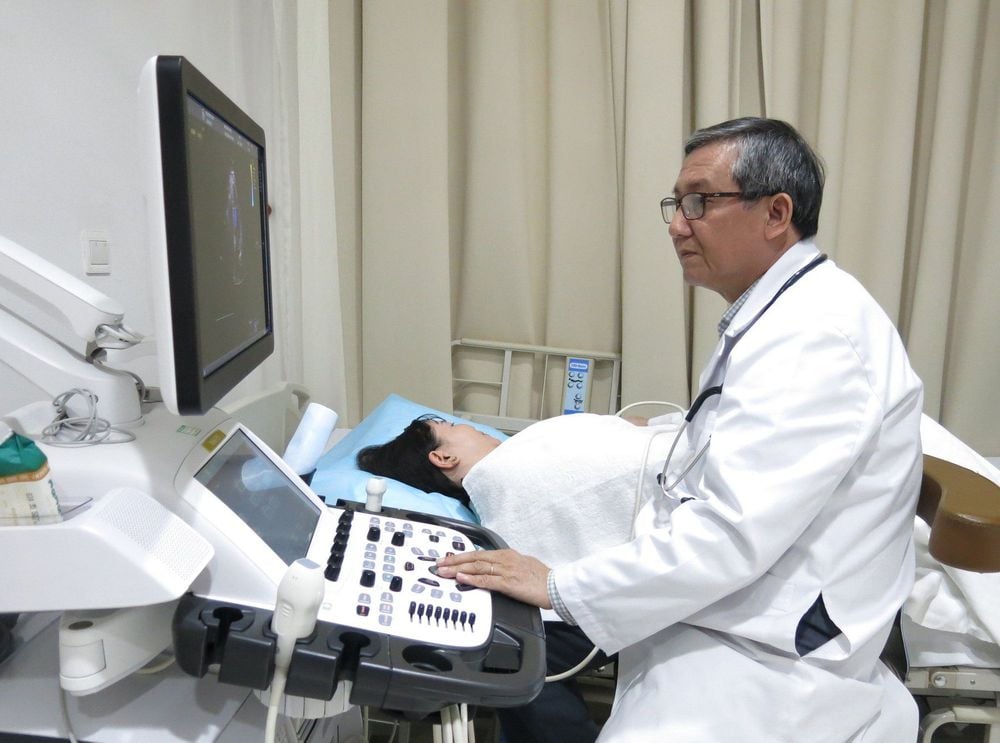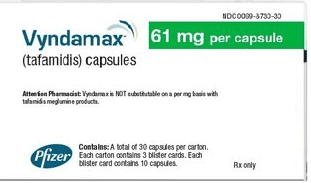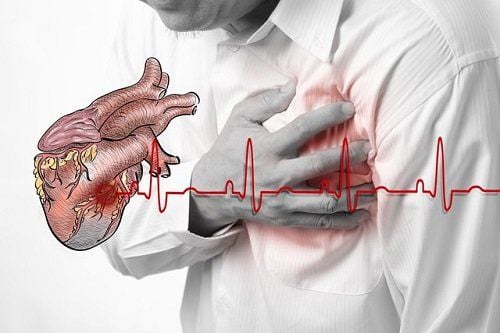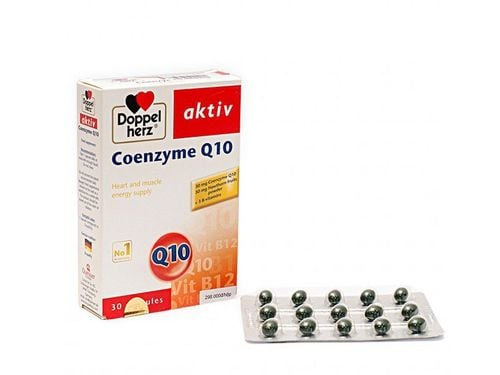This is an automatically translated article.
The article was professionally consulted by Doctor Department of Medical Examination & Internal Medicine - Vinmec Hai Phong International General Hospital
Chronic ischemic heart disease is the ferocious god that claims the lives of many patients. Understanding and choosing the correct diagnostic methods is important for effective disease detection and treatment.
1. What is chronic ischemic heart disease?
Ischemic heart disease (also called coronary artery disease, coronary heart disease, coronary heart disease) occurs when the coronary arteries are narrowed, limiting the supply of blood, oxygen and nutrients to the heart, damage part of the heart muscle. If the myocardial ischemia lasts too long, the heart tissue will die due to the lack of blood supply.
Ischemic heart disease can be acute or chronic. The clinical manifestation of chronic coronary insufficiency is angina pectoris :
Stable angina : Most common; Altered angina: Rare; Silent myocardial ischemia.
2. Symptoms of chronic ischemic heart disease
The most common symptoms of the disease include:
Feeling of pressure or tightness in the chest, difficulty breathing; Pain in the back, chest, jaw and other organs of the upper body, lasting a few minutes, gradually decreasing and recurring; Nausea, vomiting; Sweat; A cough; Anxiety, dizziness, fast heart rate.

3. Causes of chronic ischemic heart disease
Ischemic heart disease is mainly caused by the accumulation of plaque, causing hardening of the arteries, limiting blood flow in the arteries, not providing enough oxygen-carrying blood to the heart and other organs. Common causes of hardening of the arteries leading to chronic ischemic heart disease are:
High cholesterol in the blood forms plaque, blocking blood flow to the heart and other organs; Obesity, eating foods rich in fat causes the accumulation of atherosclerotic plaques; Aging: as you age, the heart and blood vessels have to work harder to pump and receive blood while the arteries are weakened, less elastic, easy to accumulate plaque; Smoke; People with insulin resistance, diabetes, high blood pressure; People with arthritis, lupus erythematosus , infection or inflammation of unknown cause. Family history of cardiovascular disease; Lack of exercise, frequent stress, stimulant use, history of preeclampsia during pregnancy.
4. How to diagnose chronic ischemic heart disease
The doctor reviews the medical history and examines the body if the disease is suspected;
Basic tests: Hemoglobin, fasting blood sugar, blood lipid system (total cholesterol, LDL-C, HDL-C, Triglycerid) help doctors assess risk factors for the disease and improve the likelihood of disease. accurate diagnosis; Electrocardiogram (ECG): Attach electrodes to the skin to record heart activity. Certain abnormalities in the electrical activity of the heart may indicate ischemic heart disease; Echocardiogram: The doctor places an ultrasound transducer on the patient's chest, which emits sound waves directed at the heart to create an image of the heart. Echocardiography helps identify damage to areas of the heart; Holter electrocardiogram: Helps detect ischemic heart disease times of the day, very meaningful for patients with coronary artery spasm or silent ischemic heart disease; Cardiac perfusion scan: The doctor injects a small amount of radioactive material into the patient's blood. While the patient is exercising, the doctor will monitor the amount of radioactive material as it reaches the heart and lungs to detect abnormalities in blood flow; Coronary angiogram: The doctor injects contrast material into the blood vessels of the heart. An X-ray machine is then used to take a series of pictures of the blood vessels, allowing the doctor to see the inside of the blood vessels in detail; CT scan: This cardiac tomography procedure helps to determine if a patient has coronary artery calcification. Doctors use CT vascular scanning to see the heart's arteries; Stress test: The doctor monitors heart rate, blood pressure, and breathing while the patient walks on a treadmill or bicycle. When you exercise, your heart contracts harder and faster than usual, so this test can help your doctor detect subtle heart problems.

5. Methods of treating chronic ischemic heart disease
5.1 Angioplasty or coronary bypass surgery A doctor performs angioplasty to widen the arteries that supply blood to the heart. During the procedure, the doctor will thread a catheter through a peripheral artery to the site of the blocked coronary artery. The small balloon attached to the catheter is then inflated to re-open the artery, allowing blood to flow normally. Your doctor may also place a small mesh tube (called a stent) at the site of the blockage) to prevent the artery from narrowing.
In some cases, your doctor may perform coronary bypass surgery. During the procedure, the doctor will transplant another blood vessel across the blocked coronary artery, allowing blood to flow below the blocked area. This procedure is sometimes performed immediately after a patient is diagnosed with chronic ischemic heart disease. However, most cases are performed after a few days for the heart to stabilize.
5.2 Medical treatment Use some of the following drugs to treat ischemic heart disease:
Blood thinners like aspirin to break up platelets, improve blood flow through narrowed coronary arteries; Thrombolytics help dissolve blood clots; Nitroglycerin dilates blood vessels; Antiplatelet drugs such as clopidogrel prevent blood clots from forming; Beta-blockers lower blood pressure, relax the heart muscle and limit the amount of damage to the heart; ACE inhibitors to reduce blood pressure and blood pressure to the heart; Pain relievers to relieve angina.
6. How to manage chronic ischemic heart disease?
Quit smoking, avoid breathing secondhand smoke;
Treatment of diseases that increase the risk of ischemic heart disease such as hypertension, diabetes and high blood cholesterol; Maintain a healthy diet: limit the absorption of saturated fat, eat more fruits, vegetables and whole grains, limit salt intake; Exercise regularly as advised by your doctor to improve blood flow to the heart; Maintain a healthy weight; Reduce stress. The most important thing to prevent and treat chronic ischemic heart disease is regular checkups. Certain factors, such as high cholesterol, high blood pressure, and diabetes, cause no symptoms in the early stages. Therefore, patients need to pay attention to periodic health check-ups to detect and treat diseases early.
7. Where is a good diagnosis of cardiomyopathy?

When chest pain occurs frequently or lasts for more than 10 minutes, the patient should go to the hospital immediately for timely diagnosis and treatment by a specialist.
Patients can choose to perform coronary and cardiac computed tomography without beta block medicine being applied at Vinmec Hai Phong International Hospital to detect ischemic heart disease early. chronic . Choosing to perform this technique brings patients many benefits such as:
Diagnosed by modern machines: CT scanner 640 slices Aquilion One (Vision Edition) for fast scanning speed and integrated reduction technology the latest 3D AIDR beam dose, reducing the dose by 75% to the patient; The machine is capable of synthesizing 320/640 slices in one revolution at speeds up to 0.275*s/0.35s; The system uses a 160mm wide acquisition Detector with 320 rows of Detector allowing to capture heart, brain,... in one rotation; iStation helps to display ECG signals, guide breathing on Gantry; SureExposure 3D continuously adjusts the imaging current during the helical scan along the three spatial axes of X, Y and Z according to the patient's body shape, reducing the radiation dose to the lowest possible; Voice and system patient guidance (Voice link); Boost3DTM allows dose reduction for areas with high X-ray absorptiveness such as the shoulder area for high-precision image acquisition; 3D color image processing (surface reconstruction, volume reconstruction, MPR, curved MPR, MIP, Cine) Visited with a highly qualified doctor of Vinmec Hai Phong: Master, Doctor Doan Xuan Sinh: yes 17 years of experience in diagnostic imaging; Specialist I Nguyen Dinh Hung: has more than 10 years of experience in diagnostic imaging (ultrasound, CT, MRI); Doctor, Doctor Pham Quoc Thanh: has 13 years of experience in the field of diagnostic imaging, has received extensive training and participated in many domestic and international scientific conferences on diagnostic imaging.
Please dial HOTLINE for more information or register for an appointment HERE. Download MyVinmec app to make appointments faster and to manage your bookings easily.













